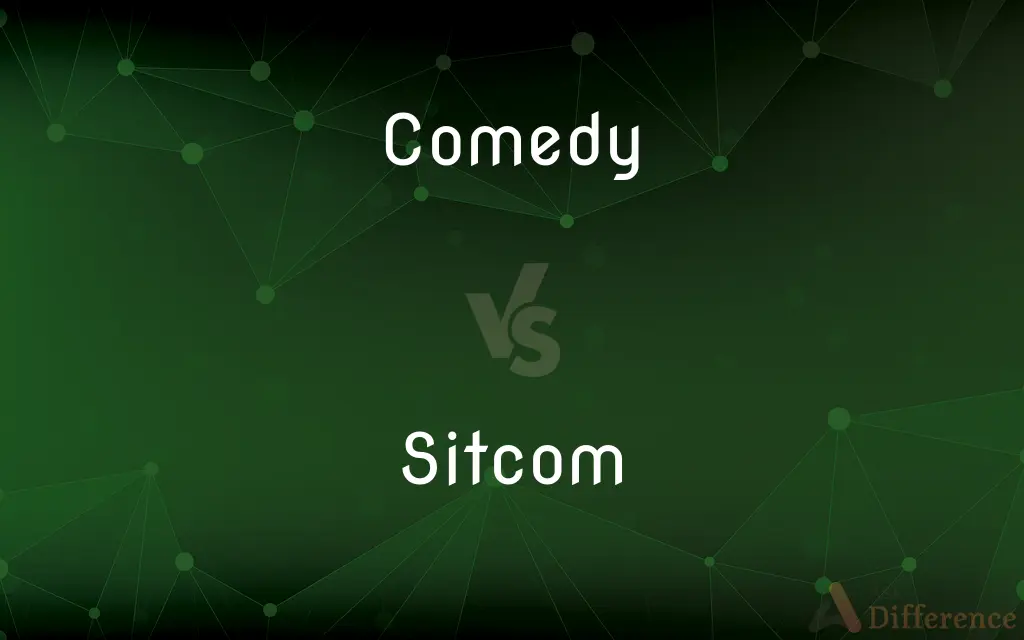Comedy vs. Sitcom — What's the Difference?
By Urooj Arif & Fiza Rafique — Updated on April 17, 2024
Comedy is a broad genre of entertainment that includes humor, while sitcoms are a specific type of comedy TV series with recurring characters in a common setting.

Difference Between Comedy and Sitcom
Table of Contents
ADVERTISEMENT
Key Differences
Comedy encompasses a variety of humorous expressions across media, including film, television, and literature. Whereas, sitcoms are a subset of comedy specifically designed for television, characterized by episodic storytelling and fixed settings.
The primary goal of comedy is to entertain and amuse the audience by exploring different themes of humor. On the other hand, sitcoms often focus on creating humor through situational mishaps and character-driven narratives in a consistent environment.
Comedy can manifest in numerous formats such as stand-up, sketches, or dramatic comedies, showcasing a wide range of humor from subtle to slapstick. Whereas sitcoms typically adhere to a formulaic structure, employing a laugh track and a 30-minute runtime per episode.
The audience engagement in comedy varies widely depending on the style and medium. Sitcoms, however, generally aim for broad appeal and regularly scheduled programming, making them accessible and predictable for viewers.
Comedies can be timeless or ephemeral, often reflecting societal norms and values through humor. Sitcoms, in contrast, are more likely to capture the everyday experiences and challenges of a specific culture or society at a given time.
ADVERTISEMENT
Comparison Chart
Definition
A genre of entertainment focused on humor.
A type of TV comedy series with recurring scenarios and characters.
Mediums
Films, TV, theatre, literature, stand-up.
Primarily television.
Structure
Variable; can be one-offs or series.
Episodic with a consistent setting and characters.
Audience Engagement
Broad, depending on humor style.
Designed for regular, episodic viewership.
Themes
Diverse, ranging widely across cultures.
Often focuses on family, work, or social life.
Compare with Definitions
Comedy
Comedy is a genre of entertainment that elicits laughter and amusement.
Shakespeare's A Midsummer Night's Dream is celebrated for its comedic elements.
Sitcom
Sitcom episodes typically resolve their conflicts within a single episode.
Each episode of the sitcom often ends with the characters learning a humorous lesson.
Comedy
Comedy can be satirical, poking fun at societal norms.
The satirical comedy sketch about politicians made a poignant yet humorous statement.
Sitcom
A sitcom is a scripted comedy series with a recurring cast and setting.
Friends is a popular sitcom that revolves around six friends living in New York City.
Comedy
Stand-up comedy features a solo performer delivering jokes to an audience.
The stand-up comedian's quick wit and clever punchlines stole the show.
Sitcom
Sitcoms often feature laugh tracks to cue audience laughter.
The laugh track in the sitcom accentuates the comedic moments, even when watching alone.
Comedy
Slapstick comedy relies on physical humor and pratfalls.
The slapstick routine, complete with pies in the face, left the children giggling uncontrollably.
Sitcom
Classic sitcoms often become cultural benchmarks.
Seinfeld, known as a show about nothing, is acclaimed for its unique approach to sitcom storytelling.
Comedy
Comedy often involves humorous characters and situations.
The comedian's routine about airport security had the audience roaring with laughter.
Sitcom
Many sitcoms focus on family or workplace settings.
The Office is a sitcom set in a mundane office, highlighting humorous interactions among employees.
Comedy
Comedy (from the Greek: κωμῳδία, kōmōdía) is a genre of fiction comprised of discourses or works intended to be humorous or amusing by inducing laughter, especially in theatre, film, stand-up comedy, television, radio, books, or any other entertainment medium. The term originated in Ancient Greece: in Athenian democracy, the public opinion of voters was influenced by political satire performed by comic poets in theaters.
Sitcom
A sitcom, clipping for situational comedy (situation comedy in the U.S.), is a genre of comedy centered on a fixed set of characters who mostly carry over from episode to episode. Sitcoms can be contrasted with sketch comedy, where a troupe may use new characters in each sketch, and stand-up comedy, where a comedian tells jokes and stories to an audience.
Comedy
Professional entertainment consisting of jokes and sketches, intended to make an audience laugh
The show combines theatre with the best of stand-up comedy
A cabaret with music, dancing, and comedy
Sitcom
See situation comedy.
Comedy
A play characterized by its humorous or satirical tone and its depiction of amusing people or incidents, in which the characters ultimately triumph over adversity
Shakespeare's comedies
Sitcom
Situation comedy.
Comedy
A dramatic work that is light and often humorous or satirical in tone and that usually contains a happy resolution of the thematic conflict.
Sitcom
A situation comedy
Comedy
The genre made up of such works.
Comedy
A literary or cinematic work of a comic nature or that uses the themes or methods of comedy.
Comedy
Popular entertainment composed of jokes, satire, or humorous performance.
Comedy
The art of composing or performing comedy.
Comedy
A humorous element of life or literature
The human comedy of political campaigns.
Comedy
A humorous occurrence.
Comedy
A choric song of celebration or revel, especially in Ancient Greece.
Comedy
(countable) A light, amusing play with a happy ending.
Comedy
A narrative poem with an agreeable ending (e.g., The Divine Comedy).
Comedy
A dramatic work that is light and humorous or satirical in tone.
Comedy
(drama) The genre of such works.
Comedy
(uncountable) Entertainment composed of jokes, satire, or humorous performance.
Why would you be watching comedy when there are kids starving right now?
Comedy
The art of composing comedy.
Comedy
(countable) A humorous event.
Comedy
A dramatic composition, or representation of a bright and amusing character, based upon the foibles of individuals, the manners of society, or the ludicrous events or accidents of life; a play in which mirth predominates and the termination of the plot is happy; - opposed to tragedy.
With all the vivacity of comedy.
Are come to play a pleasant comedy.
Comedy
Light and humorous drama with a happy ending
Comedy
A comic incident or series of incidents
Common Curiosities
How does a sitcom differ from other TV comedies?
Unlike sketch shows or comedy-dramas, sitcoms have a consistent setting and recurring characters, with humor derived from daily situations.
What defines a comedy?
Comedy is defined by its intention to provoke laughter and provide amusement through various forms of media.
Can a sitcom be considered serious entertainment?
While primarily comedic, sitcoms can address serious themes through a humorous lens, often leading to poignant cultural reflections.
What is a sitcom?
A sitcom, or situational comedy, is a genre of television series that uses the same set of characters in various humorous situations.
How has the role of comedy evolved in entertainment?
Comedy has expanded from live performances to various digital platforms, constantly adapting to new audiences and technologies.
What role does timing play in comedy compared to sitcoms?
Timing in comedy is crucial across all forms, ensuring punchlines and humor land effectively. In sitcoms, timing is also key in delivering jokes that resonate with episodic themes and character development.
How do comedians transition to sitcoms?
Many comedians transition to sitcoms by using their comedic persona or routines as a basis for characters or scenarios in the show.
What makes sitcoms popular among audiences?
Sitcoms are popular due to their relatable characters, humorous takes on everyday life, and episodic nature that allows for easy viewing.
How do comedy films differ from sitcoms?
Comedy films are standalone stories with a defined beginning and end, whereas sitcoms are serialized with recurring characters and settings.
What educational value can sitcoms provide?
Sitcoms can offer educational value by addressing social, cultural, and ethical issues in an accessible and entertaining format.
What types of comedy are there besides sitcoms?
Comedy is a diverse genre that includes stand-up, improv, sketches, comedy-dramas, and animated comedies, among others.
Are sitcoms only produced in the United States?
While the U.S. is renowned for its sitcoms, many countries produce their own, often reflecting local culture and humor.
Can a drama series include comedic elements?
Yes, many drama series integrate comedic elements to add depth and relief, creating a balanced narrative experience.
What is the future of sitcoms in the streaming era?
In the streaming era, sitcoms are evolving with more serialized storylines, diverse casts, and the absence of laugh tracks, catering to a global audience.
How do cultural differences influence comedy and sitcoms?
Cultural differences can significantly influence the style of comedy and the thematic focus of sitcoms, affecting how humor is perceived across different societies.
Share Your Discovery

Previous Comparison
Molybdenum vs. Graphite
Next Comparison
Increase vs. SkyrocketAuthor Spotlight
Written by
Urooj ArifUrooj is a skilled content writer at Ask Difference, known for her exceptional ability to simplify complex topics into engaging and informative content. With a passion for research and a flair for clear, concise writing, she consistently delivers articles that resonate with our diverse audience.
Co-written by
Fiza RafiqueFiza Rafique is a skilled content writer at AskDifference.com, where she meticulously refines and enhances written pieces. Drawing from her vast editorial expertise, Fiza ensures clarity, accuracy, and precision in every article. Passionate about language, she continually seeks to elevate the quality of content for readers worldwide.














































